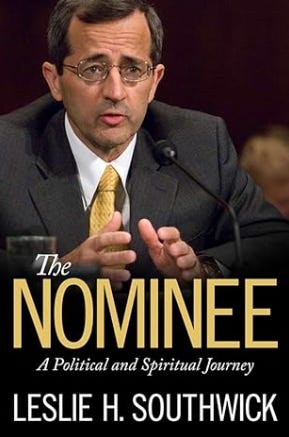Sudden Turbulence Disrupts Fifth Circuit Nominee's Glidepath to Confirmation
Leslie Southwick's unexpected ordeal
In 2007, George W. Bush nominated Leslie Southwick to the same Fifth Circuit seat in Mississippi to which he had recess-appointed Charles W. Pickering in 2004. Southwick’s confirmation ordeal reinforced, and perhaps even illustrated more starkly, two of the lessons that the bitter battle over Pickering’s nomination provided:
Senate Democrats, instead of exercising their own best judgment and abiding by their commitments, would serve as the puppets of left-wing activists on judicial nominations.
The Left would willy-nilly invent charges of racism against nominees with admirable records on race.
***
I would say that an entire book could be written about Southwick’s confirmation battle in 2007, except that Southwick has already written the book. The Nominee: A Political and Spiritual Journey is his excellent and deeply personal account of his unexpectedly difficult path and of his hopes and agonies along the way.
I might be biased in favor of the book, as Southwick generously praises my writing in support of his nomination. He includes a message he wrote to me after his nomination was confirmed:
No one came close to your intensity and quality of work in researching and then explaining the truth about the arguments concerning the disputed opinions. Though the cause does not deserve the analogy, you were my Publius, describing with zeal and with greater clarity than could be found in the original materials that were being defended.
The myths of a formidable opposition had to be demolished. No one was more instrumental in providing the weaponry for the assault on those myths than you.
***
As we have seen, Bush’s first nominee to fill Pickering’s seat, Michael B. Wallace, was victimized by an ideologically driven “Not Qualified” rating by the American Bar Association’s judicial-evaluations committee. After Democrats won control of the Senate in the November 2006 elections, Wallace recognized that he wouldn’t be confirmed and withdrew his nomination.
Wallace and Southwick embodied the respective presidential administrations in which they served. Wallace was very much part of the Reagan legal revolution. He made political enemies working to reform the Legal Services Corporation and litigating contentious fights over redistricting and abortion. He was perceived as vocal and hard-edged.
Southwick was a supporter of George H.W. Bush when Bush ran against Reagan in 1980. When Bush became president in 1989, Southwick’s ambition was to become director of the Peace Corps. He ended up instead as a senior lawyer (deputy assistant attorney general) in the Civil Division of the Department of Justice. He then served with distinction, and without controversy, for over a decade on the Mississippi court of appeals (the intermediate state court). He was mild in manner and had made no enemies.
In nominating Southwick as a replacement nominee, Bush was making peace with the liberal Democrats on the Senate Judiciary Committee. Bush had nominated Southwick to a district-court seat in Mississippi in 2006. The ABA committee gave Southwick its highest rating of “Well Qualified” for that nomination, Southwick’s confirmation hearing in September 2006 was cordial, and the Judiciary Committee unanimously reported his nomination to the Senate floor. Southwick, along with various other nominees, was lined up for Senate confirmation by unanimous consent, only to have discord unrelated to his nomination stymie any action. So instead of renominating him to the district court in 2007, the White House recognized that in the new Senate he would be an appealing candidate for the Fifth Circuit seat.
***
Southwick’s 2007 nomination to the Fifth Circuit was on a glidepath to confirmation. Or so it seemed.
In February 2007, the ABA committee unanimously rated Southwick “Well Qualified” for the Fifth Circuit. Notably, the committee member who led the investigation of Southwick was the same individual who had investigated Wallace and urged the committee to rate him “Not Qualified.” In light of the racial attacks that would be launched against Southwick, I will note that she, in addition to being African American, was on the board of trustees of the hard-left Lawyers’ Committee on Civil Rights.
In April 2007, Southwick learned that Senate Judiciary Committee chairman Patrick Leahy would schedule his confirmation hearing in May. Even better, Senate majority leader Harry Reid and Leahy assured Mississippi’s senators that Southwick would be confirmed by Memorial Day.
But out of the blue, just two days before Southwick’s hearing, liberal activist groups launched a shoddy attack on Southwick. His nomination was soon in deep peril, and only an unlikely heroine would salvage it.



